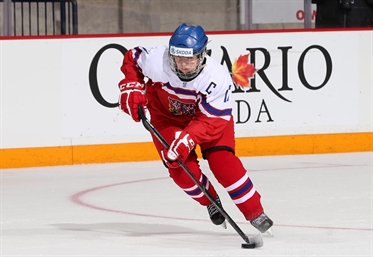Maskova, Bucifalova aim high
Maskova, Bucifalova aim high
Czechs going to high school in Canada

 ST. CATHARINES, CANADA - JANUARY 9: Canada vs Czech Republic preliminary round - 2016 IIHF Ice Hockey U18 Women's World Championship. (Photo by Jana Chytilova/HHOF-IIHF Images)
ST. CATHARINES, CANADA - JANUARY 9: Canada vs Czech Republic preliminary round - 2016 IIHF Ice Hockey U18 Women's World Championship. (Photo by Jana Chytilova/HHOF-IIHF Images)
That’s the men. But now, the women have taken a similar approach and are using evolving hockey academies in southern Ontario to attend school, learn English, and, most important, become better hockey players.
Team captain Martina Maskova is attending the Canadian International Hockey Academy in Rockland, not far from Toronto, and teammate Veronika Bucifalova is at the Ontario Hockey Academy in Cornwall, Ontario.
Indeed, these “prep schools” are a new concept for Ontario, cut from the same cloth as those popular institutions in the U.S. such as Shattuck-St. Mary’s, where Sidney Crosby, Jonathan Toews, and Zach Parise all attended.
“Women’s hockey in the Czech Republic is not very good,” Maskova admitted. “I played only with boys in my country, and I wanted to play with girls, so I came here. They contacted me and offered me a chance to go to school and play hockey, so I said for sure. I love it, but sometimes it’s hard because my family is so far away. I’m the only European on my team and I play with all Canadians and U.S. girls, so sometimes I don’t understand everything.”
Bucifalova is in the same position, but the two are able to help each other cope off ice with loneliness and that feeling of isolation. “We talk to each other all the time. It’s so nice to know someone who speaks Czech and who is your friend.”
What’s admirable is that both girls have made the sacrifice in the name of becoming better players.
“My dream right now is to become good enough to play in the NCAA and after that to play in the Olympics,” Maskova declared, a sentiment echoed by her teammate.
“Yes, the same for me. Most of the girls on the team are trying to be good enough to play in Canada or the U.S.. It’s difficult, but I think as a team we’re getting better every year.”
Bucifalova was scouted last year at the WW18 in Buffalo and jumped at the chance to play at the Ontario Hockey Academy. “Hockey in Canada is just so much better,” she enthused.
Of course, it’s a bit odd that two women from the same European country are playing in southern Ontario—and on different teams. This has led not only to the aforementioned friendship off ice but a healthy rivalry on it as the two teams are in the same league.
“We play each other a lot,” Bucifalova said with a grin. “Our teams are about even, so we’ve probably played four times and each won twice.”
After only a slight pause, she added: “But when you’re on the ice, it’s not about friends. It’s about your team, and you try to win.”
Their personal development is also intended to help their national team thrive, of course, and after last year’s bitter defeat in the bronze-medal game, 5-1 to Russia, they hope to make amends in St. Catharines.
“I think we can beat Russia this year,” Bucifalova declared. “We have so many ‘98 born players and many of those girls won a medal in Hungary two years ago (1-0 against Russia, for bronze).”
Maskova agreed: “We have a lot of skilled players and a strong team now. I think we can do it. We play as a team. We are always together. We cheer for each other. The Russians don’t do that.”
"They play as individuals,” Bucifalova chirped, smiling.
Back to Overview









































